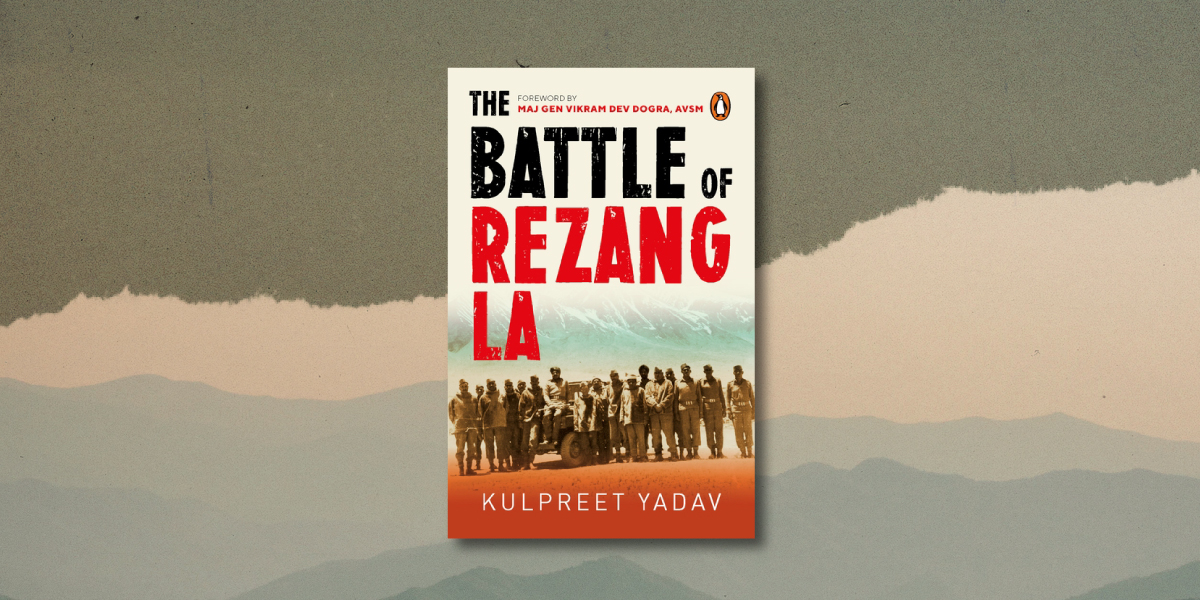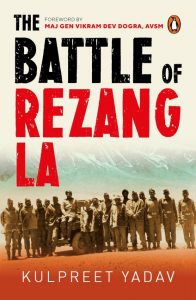
Kulpreet Yadav’s The Battle of Rezang La documents the bravery, gallantry, and patriotism of the soldiers who fought for India in 1962 war. The soldiers chose to hold their ground to the end, despite the fearful odds, defending their nation. We got the opportunity to ask him a few questions. Here are excerpts from our conversation with him.
What inspired you to write about the battle of Rezang La?
The story of Rezang La is very popular in Haryana, particularly South Haryana, from where most of the soldiers who laid down their lives in the battle came from. I hail from that part of the country and since my childhood, I have been hearing about this brave last stand of the Indian soldiers. But, at school, at college, and later as an officer in uniform, I realised that no one had heard of this battle. Somehow, due to lack of information, these brave men who sacrificed their lives for the nation had remained heroes for only the people of the villages they belonged to. After writing a dozen books, around 3 years ago, I thought, I must bring this true story of valour before the nation. The Indians, particularly the youth of the country, need to know the story of Rezang La.

What kind of research did you undertake before writing the book and did you face any particular challenges during the process?
I found out the addresses of the 4 survivors from 13 Kumaon battalion. Then I drove down to meet them. Their personal accounts were as moving as they were informative. I then started to read all the available books on the 1962 war with China and there are quite a few. This took me more than a year. The next step was to read the articles in defence journals and web portals. These articles were written by either those who had participated in the 1962 war or had information about the Ladakh sector through their colleagues. I also accessed the newspaper articles from the period just preceding or during the war. The memoirs written by the officers who were involved in the war either at the headquarters or in the field, further added to my understanding of the battle.
I also visited the 13 Kumaon battalion headquarters a few times. Since the Rezang La museum is co-located with the battalion headquarters, it became a good resource for me. The CO’s team successfully located the old war diary and when I was shown this old, hand-written account of the battle, I could get a better grasp of some of the events. I also read the official MoD’s account online. I also met and spoke over the phone to some of the officers and family members of those who were directly involved in the battle. Finally, there were a few private researchers who had been collecting information about this battle for a long time and I’m grateful that they shared the information with me. I have thanked each person by name in the acknowledgement section of the book.
What kind of emotional trajectory did you go through while writing about such a painful period in history, where we lost so many of our soldiers to the war?
It was tough. Since two of the soldiers who sacrificed their lives were related to me, it was emotionally exhausting to relive their final moments. But reliving the battle was important to write honestly and authoritatively. I had to be strong and travel back in time to see all the events through my mind’s eye. As I expanded my research, it was easy to imagine the sequence of events. I also spent a lot of time thinking about the individual soldiers, their respective positions (section post / platoon post / command post / LMG det / mortar section / Listening post (LP) / Observation post (OP) etc.) in the battle and what they must have been thinking in their final moments. To appreciate their unimaginable courage better, I also researched about their families. All of this was disturbing, but it turned my resolve to write this book that much stronger. If earlier I was sad that Indians didn’t know about this true story, by the end of my research, I was mad about why the nation didn’t know about it. Now that the book has been written and it’s available for everyone to read, all I feel is the deepest respect for these soldiers.
In what ways did you find writing a book about war different from the other books you have written?
Every book is different and takes the writer on a different journey, both internally and externally. Comparing the genres would not be the right thing to do. Let me give you an example. When I wrote my first romance novel called “The Last Love Letter”, I was confident that I would not be able to write a book that has no antagonist. But, as I started to write, it helped me discover a part of me I didn’t understand that well. Whether we write a book or read a book, books have the power to change us. To answer the question specifically, this book was different because it required me to research a lot, so it took longer and every aspect needed to be double-checked for correctness before putting it down on paper.
What do you hope readers will take away from your book?
The readers would perhaps value freedom more after reading this and realise that they need to become better citizens. That would be the proper homage to these martyrs. And one doesn’t need to be in the army to serve the nation. Each one of us needs to do what is expected out of us — in our professions and at home — and that is enough. The bottom line is, these soldiers fought and died for our motherland because they loved her. We, the readers, need to dive deeper into ourselves and learn to love our motherland more, and respect the freedom we have. Last, but not least, I would request all the readers to travel to Chushul in Ladakh at some point in their lives and pay homage to the war martyrs at the memorial called the “Ahir Dham, Chushul” that’s maintained by 13 Kumaon there.









